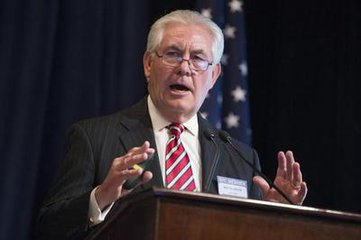Media Report

- Reuters reports: "When Kim Jong Un inherited power in North Korea in late 2011, then-Chinese president Hu Jintao was outwardly supportive of the untested young leader, predicting that "traditional friendly cooperation" between the countries would strengthen. Two years later, Kim ordered the execution of his uncle Jang Song Thaek, the country's chief interlocutor with China and a relatively reform-minded official in the hermetic state. Since then, ties between the allies have deteriorated so sharply that some diplomats and experts fear Beijing may become, like Washington, a target of its neighbor's ire. While the United States and its allies - and many people in China - believe Beijing should do more to rein in Pyongyang, the acceleration of North Korea's nuclear and missile capabilities has coincided with a near-total breakdown of high-level diplomacy between the two. Before retiring this summer, China's long-time point man on North Korea, Wu Dawei, had not visited the country for over a year. His replacement, Kong Xuanyou, has yet to visit and is still carrying out duties from his previous Asian role, traveling to Pakistan in mid-August, diplomats say."
- U.S. News & World Report reports: "Guo Wengui, an exiled Chinese billionaire who has accused some of the most senior officials of China's Communist Party of corruption, has applied for political asylum in the United States, his lawyer said. Thomas Ragland, a Washington-based lawyer, said Guo, who lives in New York and is in the United States on a tourist visa expiring this year, applied for asylum on Wednesdaybecause he feared his accusations had made him a 'political opponent of the Chinese regime'. 'This step was taken because of his very real concerns of his safety and risks he would face from the Chinese regime because of his videos, his Twitter posts, the things that he's said and written,' Ragland told Reuters by phone on Thursday... Guo, who left China in 2014, has emerged as a political threat to China's government in a sensitive year, unleashing a deluge of corruption allegations against high-level officials of the ruling party through Twitter posts and video blogs. The businessman has made it clear that he wants to disrupt an important Communist Party congress, which is held every five years and due to begin on Oct. 18."
- The Washington Post comments: "Secretary of State Rex Tillerson has often been the silent man in the Trump foreign policy team. But out of the spotlight, he appears to be crafting a broad strategy aimed at working with China to resolve the North Korea crisis and with Russia to stabilize Syria and Ukraine. The Tillerson approach focuses on personal diplomacy, in direct contacts with Chinese and Russian leaders, and through private channels to North Korea. His core strategic assumption is that if the United States can subtly manage its relations with Chinese President Xi Jinping and Russian President Vladimir Putin — and allow those leaders to take credit for successes — complex regional problems can be solved effectively... The North Korea crisis is the best example of Tillerson's diplomacy. For all the bombast of Trump's tweets, the core of U.S. policy has been an effort to work jointly with China to reverse the North Korean nuclear buildup through negotiations. Tillerson has signaled that the United States is ready for direct talks with Kim Jong Un's regime — perhaps soon, if Kim shows restraint. Tillerson wants China standing behind Kim at the negotiating table, with its hands figuratively at Kim's throat."
Calendar
- 2017-09-07 China agrees U.N. action, and talk, needed to end North Korea crisis
- 2017-09-06 China's yuan has fully recovered from 2016 and analysts say there's still room to run
- 2017-09-05 'Poke in the eye': Will nuclear test force Chinese rethink on North Korea?
- 2017-09-04 China urges North Korea to 'stop taking actions that are wrong'
- 2017-09-03 China's Xi says BRICS must promote open world economy
- 2017-09-01 As China’s big leadership revamp nears, Xi Jinping is carrying out a military reshuffle
- 2017-08-31 China-US Trade Wars and the IP Elephant in the Room
- 2017-08-30 Trump wants China to fix North Korea, but it isn't going to happen
- 2017-08-29 The North Korean Threat Beyond ICBMs
- 2017-08-28 India, China agree to pull back troops to resolve tense border dispute
News
- Reuters 'Lips and teeth' no more as China's ties with North Korea fray
- U.S. News & World Report Exiled Chinese Tycoon Guo Seeking Asylum in U.S.
- Reuters Sweeping change in China's military points to more firepower for Xi
- Newsweek China Could Be Turning On North Korea
- CNBC China August imports beat expectations, but exports disappoint
- Bloomberg China's Export Engine Slows as Imports Maintain Steady Gains
- CNBC Chinese stocks had a good summer, but surprising names are leading the way
- Quartz China's new global leadership role doesn't involve dealing with the humanitarian crisis on its doorstep
- CNBC Asia markets close mostly lower as dollar slides post-ECB and China exports were softer than expected
- New York Post China's president hopes France will restart talks on North Korea
- Reuters Fresh China worries hit Hyundai, suppliers even as plant restarts
- Reuters Taiwan activist to be tried for subversion in China in 'open' hearing
- CNN Why China can't get enough of QR codes
Commentary
- The Washington Post Tillerson is working with China and Russia — very, very quietly
- Council on Foreign Relations China Gives a Dam
- Forbes Is China Really Helping Africa
- Foreign Policy China Is Using America's Own Plan to Dominate the Future of Artificial Intelligence
- Forbes China's Bridge to Nowhere
- The Guardian 'You should consider our feelings': for Chinese students the state is an extension of family`
- ZD Net China is poised to dominate robotics markets sooner than expected